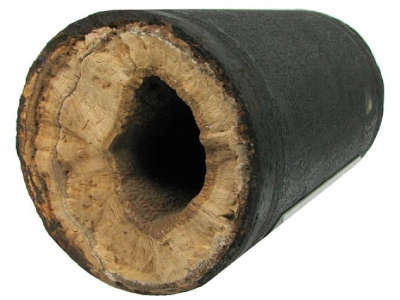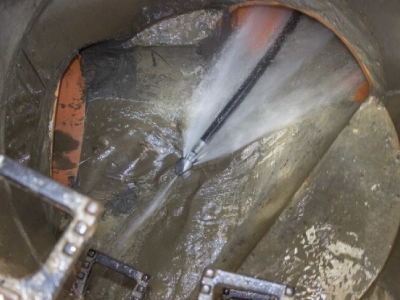A well-functioning drainage system is a necessity in ensuring the seamless operation of various types of properties, and as time passes, these systems can be afflicted by the accumulation of scale which, if disregarded, can result in myriad problems.
In homes and buildings of all kinds, the efficient operation of a drainage system is pivotal. It plays a vital role in maintaining hygiene, preventing structural damage, and promoting the overall well-being of the property's occupants. Whether it's a residential setting where families rely on the uninterrupted flow of wastewater or a commercial space that caters to numerous customers, a properly functioning drainage system is essential to ensure the day-to-day activities run smoothly.
What Is Scale?
Regarding drainage systems, ‘scale’ refers to the mineral deposits that accumulate on the inside of pipes and fixtures over time. You may hear this described as lime scale or uric scale (in some cases, concrete deposits can also disrupt drains in much the same way). Scale is primarily composed of minerals like calcium, magnesium, and iron, which are often found in water sources. Scale build-up occurs as water passes through pipes and leaves behind small mineral deposits that slowly accumulate and harden, forming a stubborn and often tenacious layer on the interior surfaces of pipes.

Scale may seem harmless at first, but it can have significant detrimental effects on your drainage system. Some of the key impacts of scale include increased blockages, as scale provides a rough surface for debris to cling to, leading to more frequent blockages and clogs in your drainage system which will then require a water drainage specialist to deal with the accumulation; reduced flow due to scale accumulating inside pipes, narrowing the diameter of the pipe, restricting the flow of water and waste, which can lead to slow drains and backups; reduced efficiency in fixtures such as faucets and showerheads with low water pressure due to scale increase in corresponding pipes; higher energy costs for appliances like water heaters and boilers which can suffer from scale accumulation on their heating elements, leading to increased energy consumption and higher utility bills.
Hydro descaling is a powerful and effective method for removing scale from drainage systems. This uses a stream of water at a very high concentration to dislodge and flush away scale deposits. High-pressure water jetting is a preferred method of removing scale due to its thorough cleaning benefits, which reaches every inch of your drainage system, ensuring the removal of even the most stubborn scale deposits from hard-to-reach sections; unlike some other methods that may involve harsh chemicals or mechanical scraping, high-pressure jetting is non-destructive and non-invasive to your pipes, minimising the risk of damage during the descaling process; as water is the sole cleaning agent, this is also an environmentally friendly method of cleaning, eliminating the need for chemicals to be used; long-lasting results are also boasted when performed by professionals, preventing scale build-up from recurring in the near future.

Ignoring scale in your drainage system can lead to a cascade of problems, including costly repairs or replacements down the line as, while scale is not an instant killer, the longer it is left, the more expensive it will be to repair the drain; health hazards from stagnant water and overflow which can also affect the treatment of sewage, posing health risks to occupants of the property; a poorly functioning drainage system can also reduce property value, making it less appealing to potential buyers or tenants.
Jetting is undoubtedly an efficient approach when it comes to combating scale build-up. Its efficacy, however, is not a catch-all solution; it will instead depend on the extent of the scale encountered in a particular situation. In instances where scale accumulation is relatively minor, alternative techniques like chemical descaling or mechanical cleaning may become the more favourable option. This ultimately will be up to the discretion of the drainage specialist you hire.
Chemical descaling, for example, involves the use of specially formulated chemicals that are able to dissolve and remove scale deposits. This method is particularly valuable when the scale build-up is not extensive because it offers a quick and cost-effective solution. When compared to jetting, the pros and cons will amount to chemical descaling being cheaper but ultimately more harmful to the environment and potentially the drains themselves, and jetting being potentially more expensive but without risking damage to the surrounding environment and the interior of the drains.
Mechanical cleaning methods involve physically removing scale deposits through the use of tools and abrasive materials. A motor is used to drive a cable through a pipe in a boring motion, much like a drill, and constantly rotates the cable. The cable itself can be fitted with various cutters per the needs of the blockage. This approach can be effective for moderate levels of scale and offers a degree of precision in the targeting of specific areas. Mechanical cleaning can be less resource-intensive than jetting, although there is always the risk of damaging the drain if handled incorrectly.
Though the use of drain jets is an effective method for descaling, its necessity depends on the severity of the scale accumulation. In some cases, especially when scale is minimal, alternative methods like chemical descaling or mechanical cleaning may prove to be the better option. However, for thorough and long-lasting results, jetting is often the go-to.
Maintaining a functional drainage system is vital for any property owner. Understanding the impact of scale and the benefits of high-pressure jetting for its removal is essential. Regular maintenance and proactive descaling can help you avoid costly repairs and keep your drainage system flowing smoothly for years to come. Don't wait until scale becomes a serious issue; invest in professional high-pressure jetting services with Grey-Water Drainage Solutions to ensure the health and longevity of your drainage system.

